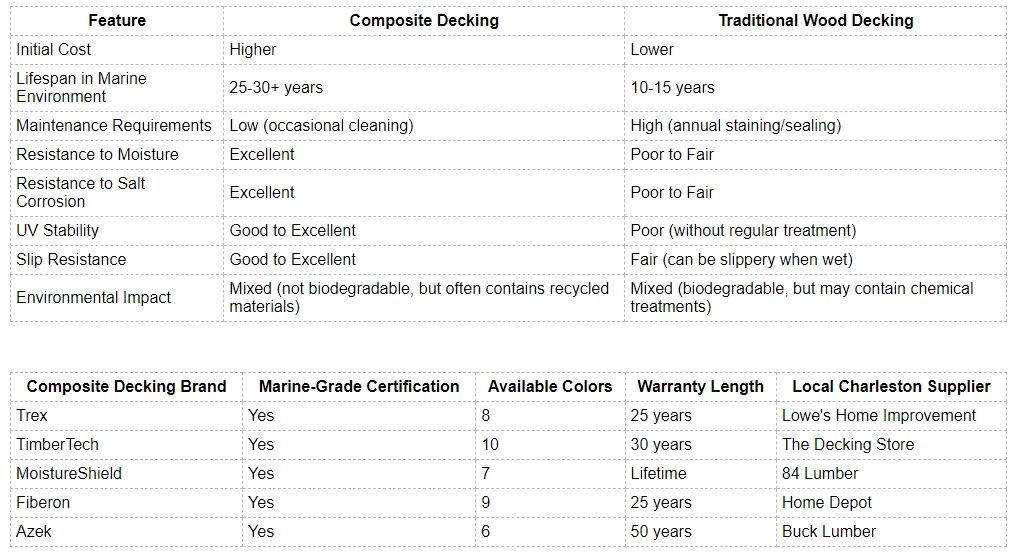Composite Decking for Marine Use: Charleston's Best Choice
Composite decking is an excellent choice for marine applications in Charleston's coastal environment. This durable, low-maintenance material can withstand harsh saltwater conditions while providing a safe, attractive surface for docks, piers, and boat lifts. As a Charleston-based marine contractor, I've seen firsthand how composite decking outperforms traditional wood in our humid, salty climate.
Key Takeaways:
- Composite decking is ideal for marine use due to its resistance to moisture, salt, and UV rays
- It requires minimal maintenance compared to wood, saving time and money in the long run
- Marine-grade composite offers enhanced durability and slip resistance for waterfront applications
- Installation techniques differ from traditional wood decking, requiring specialized knowledge
- While initially more expensive, composite decking can be a cost-effective choice over time
- Local Charleston suppliers offer a variety of composite decking options suitable for marine use
What Makes Composite Decking Suitable for Marine Environments?
Composite decking is made from a blend of wood fibers and plastic, creating a material that combines the best properties of both. This unique composition makes it particularly well-suited for marine applications in Charleston's coastal setting.
Moisture Resistance
One of the main advantages of composite decking for marine use is its exceptional moisture resistance. Unlike wood, which can absorb water and lead to rot, warping, and splintering, composite materials repel moisture. This property is crucial for docks and piers that are constantly exposed to water and high humidity levels in Charleston.
Salt Tolerance
The salt content in Charleston's coastal waters can be tough on traditional decking materials. Composite decking, however, is highly resistant to salt corrosion. This means your dock or pier will maintain its structural integrity and appearance even when subjected to saltwater spray and occasional flooding during storm surges.
UV Stability
Charleston's sunny climate can take a toll on outdoor structures. Composite decking is designed with UV inhibitors that help prevent fading and color change due to sun exposure. This ensures that your marine decking will maintain its attractive appearance for years to come, without the need for regular staining or sealing.
Comparing Composite to Traditional Wood Decking
When it comes to marine applications in Charleston, composite decking offers several advantages over traditional wood options like pressure-treated pine or exotic hardwoods.
Longevity
While a well-maintained wood dock might last 10-15 years in Charleston's marine environment, composite decking can easily last 25-30 years or more. This extended lifespan makes it a smart investment for waterfront property owners.
Maintenance Requirements
Wood decking in marine settings requires regular maintenance, including cleaning, staining, and sealing to protect against moisture and UV damage. Composite decking, on the other hand, needs only occasional cleaning with soap and water to keep it looking great.
Safety Features
Many composite decking products designed for marine use offer enhanced slip resistance, which is crucial for wet environments. This makes them a safer option for docks and piers compared to wood, which can become slippery when wet.
Choosing the Right Composite Decking for Your Charleston Dock
Not all composite decking is created equal, especially when it comes to marine applications. Here are some factors to consider when selecting composite decking for your Charleston waterfront project:
Marine-Grade Certification
Look for composite decking products that are specifically certified for marine use. These products have undergone testing to ensure they can withstand the harsh conditions of a saltwater environment.
Local Availability
Several suppliers in the Charleston area offer marine-grade composite decking. Working with a local supplier can ensure you get materials that are well-suited to our specific climate and marine conditions.
Color and Style Options
Composite decking comes in a variety of colors and styles, allowing you to choose an option that complements your home and landscape. Many Charleston homeowners opt for colors that mimic the look of weathered wood for a natural appearance.
Installation Considerations for Marine Composite Decking
Installing composite decking in a marine environment requires some special considerations:
Proper Ventilation
Ensuring adequate airflow beneath the decking is crucial in Charleston's humid climate. This helps prevent moisture buildup and potential mold growth.
Fastener Selection
Using stainless steel or other corrosion-resistant fasteners is essential for marine applications. This prevents rust stains and ensures the longevity of your dock or pier.
Expansion and Contraction
Composite materials can expand and contract with temperature changes. Proper installation techniques, including leaving appropriate gaps between boards, are necessary to accommodate this movement.
Cost Considerations for Marine Composite Decking
While the initial cost of composite decking is higher than wood, it's important to consider the long-term value:
Upfront Investment
Expect to pay more per square foot for composite decking compared to pressure-treated pine. However, the cost is often comparable to high-end hardwoods like ipe.
Long-Term Savings
The reduced maintenance requirements and longer lifespan of composite decking can result in significant savings over time. This is particularly true in Charleston's marine environment, where wood decking requires frequent upkeep.
Property Value
A well-maintained composite dock or pier can add value to your Charleston waterfront property, potentially offsetting the initial investment.
Environmental Impact of Composite Decking in Marine Settings
As stewards of Charleston's beautiful coastal environment, it's important to consider the ecological impact of our building materials:
Recycled Content
Many composite decking products contain recycled materials, reducing the demand for virgin resources. This can be an environmentally friendly choice for eco-conscious homeowners.
Chemical Leaching
Unlike pressure-treated wood, which can leach chemicals into the water, most composite decking is inert and doesn't release harmful substances into the marine environment.
End-of-Life Considerations
While composite decking lasts longer than wood, it's important to note that it's not biodegradable. However, some manufacturers offer recycling programs for their products at the end of their useful life.
Maintaining Your Composite Dock in Charleston's Marine Environment
While composite decking requires less maintenance than wood, some upkeep is still necessary to keep your dock or pier looking its best:
Regular Cleaning
Periodic cleaning with soap and water or a gentle pressure wash can remove salt buildup, algae, and other marine grime.
Stain Removal
For tough stains from fish blood or oil, specialized cleaners designed for composite decking can be effective.
Scratch Repair
Minor scratches in composite decking can often be minimized using heat from a hairdryer to slightly melt and smooth the surface.
Common Misconceptions About Composite Decking for Marine Use
Let's address some myths about composite decking in marine applications:
"It's Completely Maintenance-Free"
While composite decking requires less maintenance than wood, it's not entirely maintenance-free. Regular cleaning is still necessary to keep it looking its best.
"It's Too Hot for Bare Feet"
While composite decking can get warm in direct sunlight, many marine-grade products are designed to stay cooler than traditional composites or even wood.
"It Looks Fake"
Modern composite decking products have come a long way in mimicking the look of natural wood. Many Charleston homeowners find that it provides a beautiful, natural-looking finish for their waterfront structures.
Composite Decking on Charleston Docks
In my years of experience as a marine contractor in Charleston, I've seen firsthand how composite decking performs in our local conditions:
Durability in Storm Conditions
During Hurricane Hugo, many composite docks in the Charleston area weathered the storm better than their wooden counterparts, showing less damage from flooding and debris impact.
Resistance to Marine Growth
Composite decking has proven to be less hospitable to barnacles and other marine organisms compared to wood, making it easier to keep clean in Charleston's rich coastal ecosystem.
Long-Term Appearance
Docks and piers built with composite decking a decade or more ago still look great with minimal fading or wear, even in high-traffic areas like popular fishing spots on Folly Beach.
Composite Decking and Charleston's Building Codes
When planning a marine construction project in Charleston, it's important to consider local building codes and regulations:
Permitting Requirements
The City of Charleston and surrounding areas have specific permitting requirements for dock and pier construction. Composite decking is generally accepted but always check with local authorities before starting your project.
Load-Bearing Capacity
Ensure that the composite decking you choose meets or exceeds the load-bearing requirements for marine structures in Charleston.
Fire Resistance
Some areas may require specific fire-resistance ratings for decking materials. Be sure to choose a composite product that meets these standards if applicable.
Innovations in Marine Composite Decking
The composite decking industry continues to innovate, with new products offering enhanced performance for marine applications:
Capped Composites
These products feature a protective outer layer that provides even greater resistance to staining, fading, and scratching – ideal for the harsh marine environment in Charleston.
Textured Surfaces
New manufacturing techniques allow for more realistic wood grain textures, providing the look of natural wood with the benefits of composite materials.
Enhanced Core Materials
Some manufacturers are incorporating bamboo or other materials into their composite blends, offering even greater durability and performance in marine settings.
Making the Right Choice for Your Charleston Waterfront Project
Choosing the right decking material for your marine project is a significant decision. Here are some final thoughts to consider:
Assess Your Needs
Consider factors like budget, desired lifespan, maintenance preferences, and aesthetic goals when deciding between composite and traditional decking materials.
Consult with Experts
Work with experienced marine contractors who understand the unique challenges of building in Charleston's coastal environment.
Think Long-Term
While the upfront cost of composite decking may be higher, consider the long-term benefits in terms of durability, maintenance, and overall value for your waterfront property.
Composite decking offers many advantages for marine use in Charleston's coastal environment. Its durability, low maintenance requirements, and resistance to the harsh conditions of saltwater exposure make it an excellent choice for docks, piers, and other waterfront structures. By carefully considering your specific needs and working with knowledgeable professionals, you can create a beautiful, long-lasting marine structure that will enhance your Charleston waterfront property for years to come. For more information, you can visit our website or contact us.

- Factors to consider when choosing composite decking for marine use in Charleston:
- Salt and UV resistance ratings
- Slip resistance performance
- Local availability and supplier support
- Compatibility with existing structures
- Color options that complement coastal aesthetics
- Warranty coverage specific to marine applications
























































